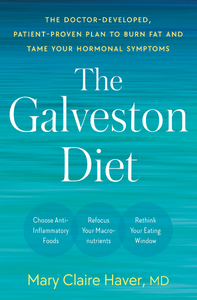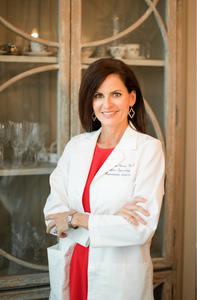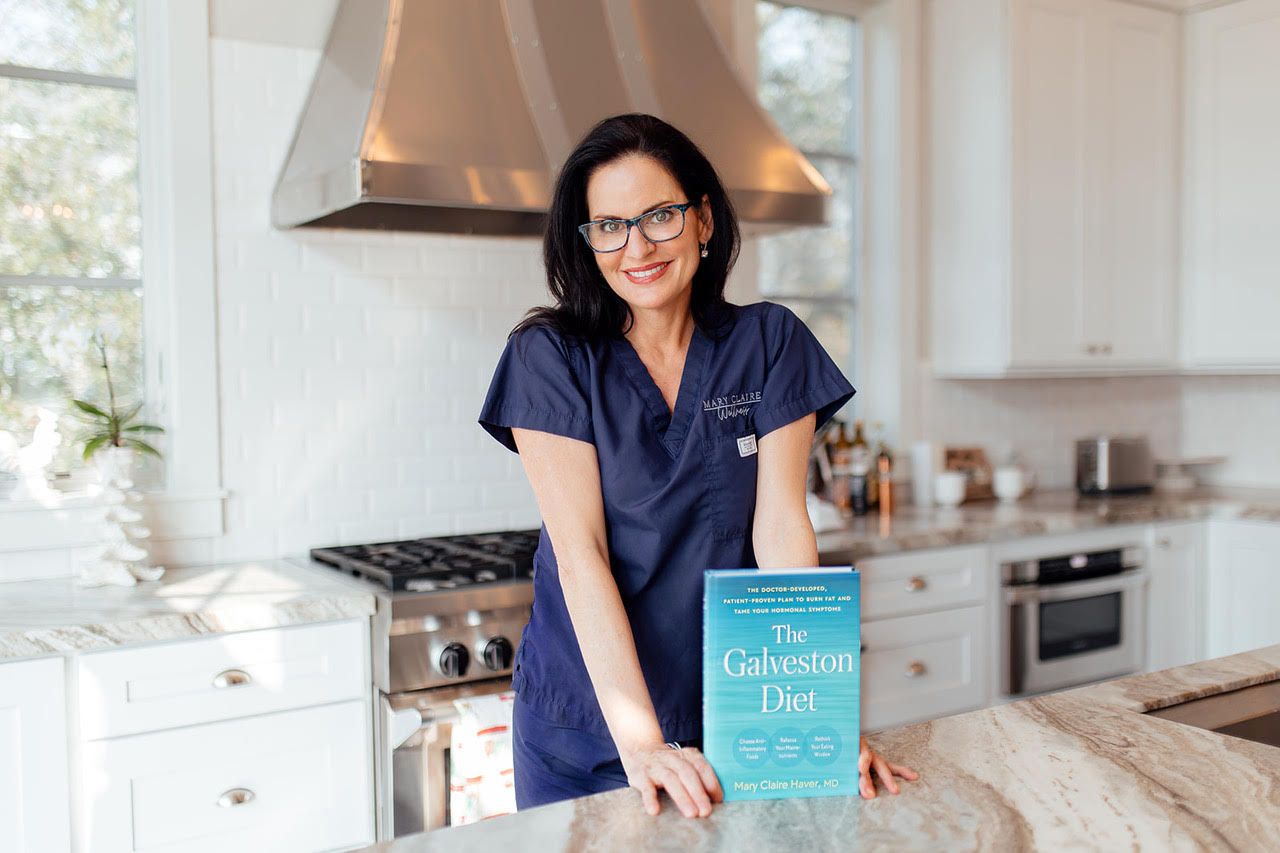Menopause Is Having a Moment... Meet the Doctor Who's on a Mission to Make Women in Midlife Feel Seen
Mary Claire Haver, MD, was fresh out of medical school and fielding questions from women with common perimenopause symptoms that she didn’t know how to treat.
When she talked to her boss, an older male doctor, about what she was hearing from these women (hot flashes, unexplained weight gain, zero sex drive) he brushed it off as no big deal.
“He called them WWs, short for ‘whiny women,’ and told me to pat them on the knee and tell them to eat less and exercise more,” says the board certified OB/GYN and certified culinary medicine specialist. And that’s essentially what she did (minus the patronizing there-there pat on the knee, of course)—until Dr. Haver hit perimenopause herself. Once those symptoms hit her, she realized how deeply the medical community had been failing women, and she decided to do something about it.
Now, a self-proclaimed “menopause warrior,” Dr. Haver is on a mission to empower women of all ages by educating them about what she calls the privilege of menopause. In her new book, The Galveston Diet, she outlines the strategy that helped her—as well as roughly 100,000 other women—rock this time in their lives.
A CONVERSATION WITH DR. MARY CLAIRE HAVER
How has treating women in menopause changed (or not) throughout the years you’ve been practicing?
I finished my medical school residency in 2002, which is the year the Women’s Health Initiative study came out [a trial of menopausal hormone therapy that found the adverse effects of hormone therapy outweigh and outnumber the benefits—which has since been debunked]. At that time, the world was scared to death about that study. Add to that the fact that we received very little menopause training, and at the time I felt like it would be malpractice to give my female patients complaining of menopausal symptoms hormone therapy.
Thankfully, this has changed. But we’ve still got a long way to go in truly helping women going through menopause.
In your new book, The Galveston Diet, you write about how your own journey through perimenopause opened your eyes to how we’re largely failing women going through the menopause transition.
When I was a young doctor, in my 30s, I vividly remember seeing patients who were having issues with weight gain and sexual desire. They were exercising, eating the same as they always had, in beautiful relationships—and on the struggle bus. I’ll never forget talking to my boss at the time, sharing stories of these patients with him. His response? Pat them on the knee, tell them to have a glass of wine, and suggest they work out more and eat less.
It took menopause happening to me to say, Wait a second. Something needs to change!
At first, my focus was on body composition changes that were happening to me. I went down a rabbit hole on PubMed trying to figure out why I was gaining belly fat. I couldn't get rid of it. I started learning more about visceral fat (fat that accumulates around your organs) and how dangerous it is; then, I read studies about things like joint pain and new onset mental health issues that can surface during the perimenopausal years.
I started sharing what I was learning on social media and 10,000 women would reply. What started out as personal frustration turned into a new commitment to having a bigger conversation around menopause.
When you started making changes to combat your perimenopause symptoms, you focused on food. What did you do?
Three things:
No. 1: I started intermittent fasting. I ate within an 8-hour time period and fasted for 16 hours a day. I’d read so much about how good it was for helping inflammation, and lowering insulin levels, both of which change with perimenopause and contribute to weight gain. I worked on this first and felt a lot better quickly! My brain fog was better, and I was still getting plenty of nutrition.
No. 2: I continued intermittent fasting and also turned my focus to the quality of what I was eating. I stopped counting calories and fat grams and started choosing anti-inflammatory foods. I loaded up on vegetables, protein, and healthy fats and didn’t eat anything with ingredients made in a lab.
No. 3: I got even more thoughtful about my macronutrient ratio: I aimed for 70 percent healthy fats, 20 percent lean protein, and 10 percent quality carbohydrates. This ratio accomplishes three major metabolic feats: it encourages the body to burn fat; it trains you to break the addiction to sugar and processed carbs; and it refocuses your eating on healthy sources of fats, protein, and carbs.
When I did these three things, the pudge came off and stayed off. My hot flashes were better. And it all felt pretty effortless.
OK, so why do these three diet tweaks—what would become the major tenants of The Galveston Diet—work so well?
Intermittent fasting has enormous benefits for women in terms of hormone balance, metabolism, and lowering inflammation. Of all the components of The Galveston Diet, this is the one that moves the needle for most women.
The reason anti-inflammatory nutrition is so crucial is because inflammation tends to get worse in women as we age and experience menopausal hormone fluctuations. Not only is chronic inflammation the underlying issue in many diseases, it also triggers weight gain—and weight gain also triggers inflammation, so they feed off each other in a crazy cycle.
Finally, refocusing your “fuel” so your diet is made up of 70 percent healthy fats, 20 percent lean protein, and 10 percent quality carbohydrates. This ensures that you’ll burn all the glucose you have in your bloodstream, so it’s not stored as body fat. For consistent, lasting weight loss, your body must shift its energy usage to rely more on fat as its fuel rather than glucose. It’s a metabolic fact.
What’s your best advice for women who feel misled about menopause or ignored by their doctors?
The best thing all of us can do is to educate ourselves. The more you know about the signs and symptoms of menopause and potential treatments before you hit perimenopause, the more you’ll tee yourself up for a smoother ride. Sadly, there’s not enough research, attention, and education happening about menopausal symptoms and their impact on women’s overall health. You have to be your own advocate until the medical community catches up.
If you’re currently dealing with menopausal symptoms like hot flashes, low libido, brain fog, or other symptoms, it’s important to know your menopause toolkit! There are things you can do—including changes to your nutrition, exercise, pharmacology, and supplements—that can help.
If you’re past menopause, the lifestyle changes I outline in The Galveston Diet are going to improve your health. You’re never too old to live your best life, and this way of eating and living can not only improve your health but bring you more joy, too.
What’s your best advice for finding accurate information about menopause—and a healthcare practitioner who really feels like an ally on the journey through menopause?
The best sources for accurate info on symptoms and treatment like menopausal hormone therapy are the North American Menopause Society (NAMS), the American College of Obstetrics and Gynecology, and Menopause.org.
Some red flags that should prompt you to run the other way include anyone who utters the terms “balancing hormones” or “bioidentical hormones” or says they can “cure” your symptoms. Remember, menopause care is comprehensive. There is no miracle cure.
It’s also crucial to ask the right questions when looking for a practitioner. When you call for an appointment, ask if menopausal hormone therapy is something the practitioner offers. I always like to tell women to ask to speak to the office nurse; you likely won’t get the doctor on the phone, but the nurse will fill you in!
What’s your best advice for any of us who are struggling to stick to intermittent fasting, or an anti-inflammatory diet?
Remember, nobody does it perfectly! When you’re at a party, I want you to eat the cake! Remember the 80/20 rule: If you can stick to healthy patterns 80 percent of the time, you’ll lay down the patterns for those healthy habits to stick.


Mary Claire Haver, MD, is a board-certified OB/GYN and a Certified Culinary Medicine Specialist. She developed her groundbreaking weight-loss protocol as an online subscriber program, through which she has helped nearly 75,000 women lose weight, burn fat, and get in shape permanently. Dr. Haver lives with her husband and two daughters in Galveston, Texas.
Question from the Editor: If you haven’t hit menopause yet, do you feel prepared? And if you’ve been through this transition, did you feel well cared for or ignored by the medical community?




